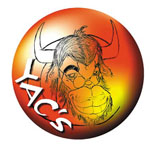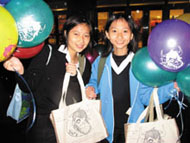Project
 Number:
2003-055-1-050
Number:
2003-055-1-050
Title: Young Ambassadors for Chemistry (YAC)
Task Group
Chairman: Lida Schoen
Members: Anthony
D. Ashmore, John Bradley,
Mei-Hung Chiu, Keith
Kelly, Charmaine Klein,
Norma Nudelman, Jen
Jang Sheu, and Natalia
Tarasova
Completion Date: 2007 - project completed
>
Final poster presented in Aug 2007
at the IUPAC Congress
in Torino, Italy [jpg - 361KB]
Objective:
To enhance Public Understanding of Chemistry through teacher and student
school audiences in target transition regions.
The project will be carried out in partnership with a successful global
science education programme, to train teachers and provide resources
to develop the communication skills of young people and teach them to
be young ambassadors for chemistry. It includes an evaluation of the
impact of the 'train the trainers' model in increasing public understanding.
Description:
Young Ambassadors for Chemistry (YAC) will be a partnership between
IUPAC's CCE Public Understanding of
Chemistry subcommittee and the Science Across the World Network
to facilitate the flow of ideas between chemistry and society. This
project will use the 'train the trainer' model to create public interest
in chemistry in four transition areas with strong IUPAC CCE representatives:
Taiwan, Russia and the Balkans, Argentina, and South Africa.
Science Across
the World (SAW) is a successful schools educational programme encouraging
communication and shared learning by young people (10-16 years) on important
scientific issues of public interest in 90 countries. SAW's web site
has an up-to-date database of schools and teachers and established methods
for exchanging ideas and information between schools all over the world.
As the school is very often at the hub of the community, opinions shared
during learning may filter well beyond the student and the classroom.
The present project builds on the highly successful collaboration between
IUPAC and SAW in a 2003 global poster competition for children, featured
on the cover of the Nov/Dec
2003 Chemistry International.
Building on successful SAW experiences, we will run workshops for teacher
trainers and teachers based on two existing topics with a broad 'Chemistry
in Society' basis: 'Chemistry in our Lives' and 'Talking about Genetics
around the World' (chemistry being the basis of our knowledge about
DNA and genetics). The trained teachers will carry out SAW projects
including the exchanges with partner classrooms in other countries and
prepare students for interaction with their local community. In carrying
out the SAW projects students will research aspects of chemistry in
the local context, which they will then as Young Ambassadors for Chemistry
(YACs) present to the local public.
This programme will also utilize the networks of the British Council,
and the FACT (Forum for the support and development of Content and language
integrated Teaching) Network (1035 participants from 40 countries around
the world) for communicating good practice among the teaching community
around the world. The present project brings this IUPAC/SAW partnership
to four important transition areas, equipping key people there to train
more Science (and language) teachers to work with the programme and
train Young Ambassadors for Chemistry in their classrooms.
Steps to deliver this programme will be:
- Translation of student and course materials in the national language
(e.g. Mandarin, Russian) to be used in the four regions.
- Local workshop of trainers with local teachers; (train the trainers
model), followed by local workshops where trained teachers train more
teachers and YACs.
- YACs run local public awareness events.
Students will become ambassadors by first carrying out a SAW project
with their teachers in schools and through the SAW website (www.scienceacross.org).
The students will be trained in planning and running small-scale events
such as 'constructing the largest 3D model of DNA from sweets in a supermarket
for one day' as part of the SAW pack 'Talking About Genetics Around
the World' or 'producing cosmetics in a national 'line' and marketing
them' as part of 'Chemistry in our lives'. A key component is to actively
encourage students to gather opinions from the local community. During
the event students engage the public in activities such as partial construction
of the DNA model, and talk to the public about their understanding of
the importance of DNA discovery for today's world. Reponses and opinions
will be gathered and recorded by the students. Thousands of members
of the public could be reached during a single day event. Other public
understanding outcomes come from the impact on schools, and local and
national media coverage.
A final event can be a conference of YAC's as a follow up to regional
events where YACs present their work, products and research to their
peers.
Progress:

The first of a series of four workshops for Science and Language teachers
was held 22–26 November 2004 at the National Taiwan Normal University
(NTNU) in Taipei. See report in Chem.
Int.
Mar/Apr 2005.
On 16-17 April 2005, during the 5th Arab Conference on Teaching
and Learning held in Cairo, Egypt, Lida Schoen made a plenary presentation
on YAC, outlining the aims of the project and format of the events organized
as part of it. A Q&A session followed, and thoughts were put forward
to coordinate an interactive discussion (using video conferencing) with
more teachers, on how to consider possible YAC events in Egypt and/or
Jordan.
A second YAC event was organized in Buenos Aires, Argentina,
on 9-15 May 2005. The workshop was hosted by ESSARP, the English Speaking
Scholastic Association of the River Plate (www.essarp.org.ar)
in the heart of Buenos Aires.
The third leg of the YAC project was Krasnoyarsk, Russia, where
activities took place from 14-18 November 2005.
> see report in Chem.
Int.
Mar/Apr 2006.
In February 2006, an event was coordinated in Korea > see
report in Chem.
Int.
Sep/Oct 2006.
In March 2007, an event was held in Grahamstown, South Africa
> see report in Chem.
Int.
Jul/Aug 2007.
> Final report; 21 July 2007 [pdf
- 1.35MB]
project completed
Last update: 26 July 2007
<project announcement published in
Chem.
Int. Sep-Oct
2004>
If you
want to update this information, contact us by e-mail
Do not forget to include the Project Number,
your name and relation with that project

